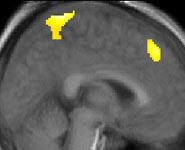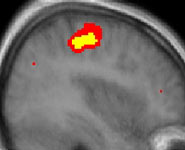Brain imaging reveals how we learn from our competitors
October 14, 2010

Our neural activity tends to be stimulated by our competitor’s errors (as in the example shown here) rather than their successes. (Bristol University)
To reveal how people and animals learn from failure and success, Bristol University researchers scanned the brains of players as they battled against an artificial opponent in a computer game.
In the game, each player took turns with the computer to select one of four boxes whose payouts were simulating the ebb and flow of natural food sources.
Players were able to learn from their own successful selections but those of their competitor failed completely to increase their neural activity. Instead, it was their competitor’s unexpected failures that generated this additional brain activity. Such failures generated both reward signals in the brains of the players, and learning signals in regions involved with inhibiting response.
This suggests that we benefit from our competitors’ failures by learning to inhibit the actions that lead to them.
Mirror neurons activated by competitor selections

This region of the mirror neuron system in the player’s motor cortex increased its activity when the player made moves and also when they observed their computer opponent making the same “virtual” moves, even though they knew it was a computer. (Bristol University)
Surprisingly, when players were observing their competitor make selections, the players’ brains were activated as if they were performing these actions themselves. Such mirror neuron activities occur when we observe the actions of other humans but here the players knew their opponent was just a computer and no animated graphics were used. Previously, it has been suggested that the mirror neuron system supports a type of unconscious mind-reading that helps us, for example, judge others’ intentions.
“We were surprised to see the mirror neuron system activating in response to a computer,” said Dr. Paul Howard-Jones, Senior Lecturer in Education in the Graduate School of Education. If the human brain can respond as though a computer has a mind, that’s probably good news for those wishing to use the computer as a teacher.”
Ref: The neural mechanisms of learning from competitors (NeuroImage)
Adapted from materials provided by Bristol University.